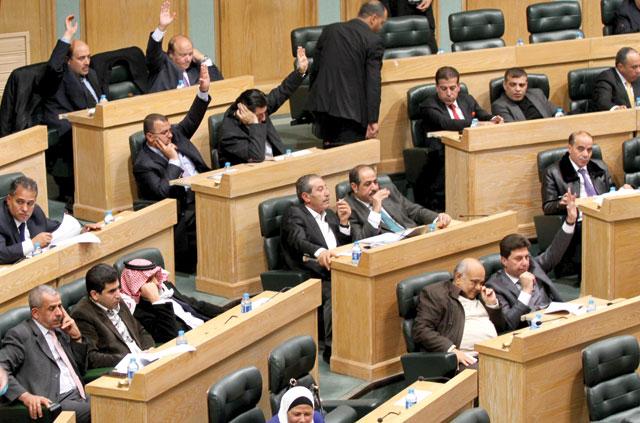You are here
‘Steep drop in oil prices calls for revising 2015 draft budget’
By Khetam Malkawi - Dec 14,2014 - Last updated at Dec 14,2014

AMMAN — The continuing slide in oil prices may force budget planners to change key assumptions in next year’s government spending bill, which is currently under debate at the Lower House Finance Committee.
MP Yousef Qorneh, head of the committee, said the government prepared the draft state budget law based on global oil prices averaging $100 a barrel.
However, the recent slide in prices to less than $60 a barrel, a price that it last reached in May 2009, prompted the committee to stop deliberating the bill, according to Qorneh.
“The assumptions in the budget are no longer valid,” he told The Jordan Times on Saturday, adding that the committee will ask the government to redraft articles related to international oil prices. The budget, he said, should be based on the price of $80 a barrel.
Moody's Investors Service has lowered its pricing assumptions for the two benchmark crude oils, European Brent and West Texas Intermediate (WTI), by $10 in 2015 and $5 in 2016, according to a statement released by the rating agency.
"Moody's revised its assumptions for average spot prices for Brent crude [a proxy for the world market] to $80 per barrel for 2015 and to $85 per barrel in 2016, and for WTI crude [a proxy for North American production] to $75 per barrel in 2015 and $80 per barrel in 2016 and thereafter," the statement said.
The Cabinet endorsed the draft state budget law for 2015 and presented it to the Lower House last month, with a slight expansion of 3.2 per cent in spending and an estimated deficit of JD688 million. The size of the budget is JD8.09 billion.
According to Qorneh, direct cash support for citizens in compensation for lifting fuel subsidies stands at JD180 million, but this will not be valid as prices are set to remain under $100 oil a barrel.
However, he said that the government has hinted it will cancel such allocations, which will ultimately be considered as surplus.
“We will not reject the bill or return it to the government for the time being, but we want it amended,” the MP said.
The Jordan Times contacted Finance Ministry Secretary General Ezeddin Kanakriyeh and General Budget Department Director Mohammad Hazaimeh to comment on Qorneh’s remarks.
Kanakriyeh said it was the responsibility of the budget department to amend assumptions, while Hazaimeh insisted it was the mandate of the ministry.
Other Finance Ministry officials contacted by The Jordan Times declined to comment on the government’s action in this regard.
However, economic analyst Zayyan Zawaneh said the Ministry of Finance should withdraw the budget bill from Parliament and submit another amended draft based on the new oil prices.
Zawaneh told The Jordan Times the “government should play it smart” and build the law based on an average price, “not to go for $30 and not to keep it exaggerated as $100”.
He echoed Qorneh’s proposal that drafting the budget law based on the assumption of $80 per barrel is fair, noting that this will result in 20 per cent savings in the budget.
Related Articles
Deputies are expected to start deliberations over the draft 2015 state budget law next week, the head of the Lower House Financial Committee, Yousef Qorneh, said Wednesday.
The Lower House will begin deliberating the 2015 draft state budget law next Sunday.
Unexpected developments helped trim Jordan's public debt by nearly JD700 million by the end of 2014, the head of the Lower House Financial Committee, MP Yousef Qorneh, said Thursday.


















